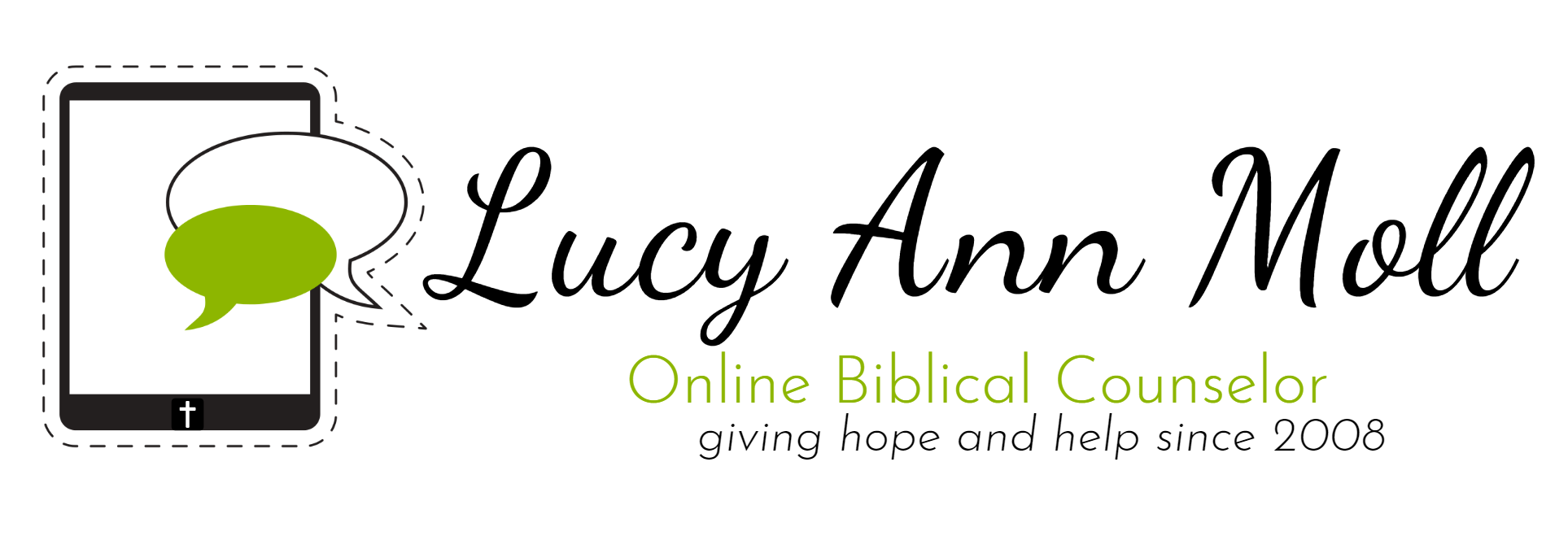
by Lucy | Apr 24, 2021 | biblical counseling, relationships |
Who do you aim to please? Your boss, your husband, your reputation, your bank account, your dog … yourself?
Anything or anyone placed ahead of God can become an idol. These may include things like,
- approval
- love
- comfort
- security
- significance
These seem innocuous, but they can ensnare us. They keep wanting more and more. Feeding an idol is a horrible, exhausting way to live.
In this article, we’ll first get a picture of what idol-worship may look like. It may be more common than you think. Then we’ll discover its antidote: growing in the fear of the Lord.
Meet an idol-worshiper.
Linda (name and some details have been changed) deeply desires that her Christian husband stop binge-drinking. His problem is obvious, but what’s hers?
She thinks that if she acts sweet (by picking up the kids’ toys before he returns home from work and by making nice dinners, for example), then he’d quit drinking and she’d get what she wants.
But no matter how sweet she is or how often she pleads with him to stop drinking, he continues to buy a 12 pack of beer and guzzle all of the beers when he comes home after work. Not every night … but often enough to cause her concern and fill her with fear.
There is nothing wrong with wanting a husband who makes wise choices. But when a desire becomes a demand, we have begun to make it an idol.
What’s her idol? Security. She says to herself, “I must have a godly and sober husband who cares for me and the kids, or I cannot be happy.”
You worship what you fear.
How do we tell if we are pleasing someone or something instead of God? Elyse Fitzpatrick nails it:
If she is willing to sin to obtain her goal or if she sins when she doesn’t get what she wants, then her desire has taken God’s place and she is functioning as an idolater.
Look back to the example of Linda. When her husband disappears into the garage with his 12-pack, she pouts and pleads, worries, and falls into self-pity. Her actions are understandable. Yet they are sins that she needs confess. This may not seem fair. We often sin in response to being sinned against.
A husband yells at his wife, the wife screams at the kid, the kid kicks the dog.
This dynamic may play out in your life too. It does in mine. When a friend failed to get back to me, and I feel ignored, I may sulk. When my husband seems more interested in TV than me, I may snap at him.
Choose better … please God only.
In her book Holy Fear, Christina Fox helps us to trade lesser fears for the fear of the Lord. Here are three ways she highlights.
1. Study God’s word.
To grow in the fear of the Lord, we must know him, and the very best way is to study God’s word. When we read scripture, we can ask ourselves, “What does this teach me about God?” The more we learn about who God is, the more we grow in our fear of him.
2. Remember God’s works.
As we recall that God rescued the Israelites from slavery in Egypt, the prophet Jonah from the belly of the great fish, the apostle Paul from death time and time again, we grow in the fear of the Lord and desire to please him only. Great ways to remember God’s works today: worship with other believers on the Lord’s Day, sing praises to him, and share at the communion table.
3. Pray for greater fear.
Prayer helps us to depend on God more and ourselves less. “We find our hearts reshaped to want what God wants more than what we want,” Fox says. “We grow to want his glory and fame spread throughout the world and not our own. Indeed, prayer not only feeds and nourishes us, it transforms us.“
So who do you now aim to please?
God is jealous for our love. He hates your giving it to anyone or anything but him.
You shall have no other gods before me. (Exodus 20:3)
As we grow in the fear of the Lord, we will aim to please him, not a person or a thing like money, approval, security, or any lesser fear. When Linda came to realize that she wanted security above all things, even God, she agreed with the Lord that her desire was misdirected. She poured out her heart to the Lord, asking him to help her love him most of all.
Her husband still drinks sometimes, but less than before. Most importantly, she has a new attitude that God will provide her everything she really needs. The Lord is her safe place.

by Lucy | Jul 16, 2020 | biblical counseling, emotions, relationships |
When we are under a lot of stress, our anger may bubble over and scorch someone. Then what?
We may think that we are justified in our anger and that the other person deserved our hot words or our icy stare. But Scripture provides a better way: confession leading to forgiveness. In other words: an apology!
Here is an article I wrote for the Biblical Counseling Coalition in the middle of the 2020 pandemic. I hope it helps!

Jack and Jill needed help in making an apology. Yes, they are living the American dream: steady employment, a nice home, two healthy children, and a marriage that has lasted eleven years. But there is a problem. But under his successful veneer, Jack becomes angry when he doesn’t get what he wants and lets his family know it, loudly. Jill also gets mad—a quiet simmering, stewing kind of anger that is just as nasty as her husband’s.[1]
Each has said and done things that, at the time, made sense in the heat of their anger. Their relational pain prompted them to make an appointment with a biblical counselor who showed them from Scripture that an angry heart is the cause of their conflict (Matt. 5:21-22; Mark 7:20-23; Luke 6:43-45; James 4:1-2; 1 John 3:15).
This was news to Jack and Jill, both Christians. He had figured that his upbringing was at fault for his anger problem and that his wife’s monthly hormonal swings had caused her irritation. As they were beginning to each take responsibility for their own sin, Jack and Jill needed to replace their old way of sweeping their anger under the rug, which had only created more problems (James 1:19-20).[2]
It is essential to relational healing for the wrongdoer to confess to the harmed party how he or she failed. We often call this “making an apology.” This blog post covers a sliver of forgiveness—specifically, seven parts of an apology, outlined by Ken Sande, author of The Peacemaker. Making an apology is an art that requires humility. But usually, we mumble a quick “I’m sorry” or say, “Let’s just forget it, okay?” These non-apologies rarely bring about true forgiveness and may deepen resentment.
So, what’s a better way? Consider “Seven A’s of Confession.”[3]
1. Address Everyone Included
First, confess your sin to God (Ps. 32:5; 41:4), then to every person who has been touched by it. Ken Sande differentiates between a “heart sin” and a “social sin.” “A “heart sin” takes place only in your thoughts and does not directly affect others. Therefore, it needs to be confessed only to God.”[4] But often, a sin is not only a heart sin but a social sin that is evident in our behavior. When Jill felt anger toward Jack, for example, she very rarely talked to him about it; instead, she became irritated and sniped at him and their children. In counseling, she learned of her need to confess the sin of grumbling to each of them and seek their forgiveness.
2. Avoid If, But, and Maybe
Using these words negates the confession, for it shifts the blame to others or minimizes guilt. The best example: “I’m sorry if I’ve done something to upset you.” Isn’t it amazing that the tiny word “if” ruins this frequent “confession”? It implies that the person does not know whether there was any wrongdoing in the first place.
Other examples of non-confessions:[5]
“I shouldn’t have gotten mad, but I was tired.”
“I know I was wrong, but so were you.”
3. Admit Specifically
The more detailed the apology, the better. Rather than saying, “I acted like a jerk yesterday,” you might say, “I’ve been taking out my frustrations on you. I have had a lot of stress caring for the kids, but this doesn’t give me an excuse to criticize you and nag you.”
When possible, identify how you violated God’s will. When you detail your wrong and focus on where you need to change, then the other person is more likely to respond positively to your apology.
4. Acknowledge the Hurt
Acknowledgment may rightly sound like, “I can only imagine that you felt fearful when I didn’t come home until late last night” or “I can only imagine that when you found a porn site in my search history, you felt deeply hurt and angry.” For an apology to be effective and meaningful, you must express sorrow. The sorrow must be genuine, of course: “For godly sorrow produces a repentance that leads to salvation without regret, whereas worldly grief produces death” (2 Cor. 7:10). People see through a fake confession, and it simply makes things worse (Prov. 6:16-19).
5. Accept the Consequences
Winston Smith relates a story of forgiveness granted easily to someone who had sideswiped his wife’s car and had left a note on the windshield, admitting wrongdoing and offering to pay for repairs. “After a few phone calls and a trip to the body shop, the car was repaired, and a check from the offender came in the mail. All was forgiven.”[6]This person acknowledged their wrongdoing and accepted the consequences.
We read examples of restitution in the Bible, too. A primary example is the chief tax collector, Zacchaeus, who had climbed a sycamore tree. What made his confession believable was his eagerness to pay back the people he had cheated. When he met Jesus, he declared that he’d give half of his possessions to the poor, and “if I have cheated anybody out of anything, I will pay back four times the amount” (Luke 19:8). The greater your willingness to repair the damage you may have caused, the more believable your confession.
6. Alter Your Behavior
In counseling, Jack and Jill came to understand that their anger arose from a selfish heart. Jack wanted peace and quiet; Jill desired comfort. Jack learned to repent of the evil desires that produced his anger and to receive God’s forgiving grace.[7] Likewise, Jill became aware that she was bitter toward her husband and turned to Jesus in repentance and faith.[8]
As they each confessed their sin to God and thanked Him for His forgiveness, they began to alter their behavior. One change they made was to speak the truth in love (Eph. 4:15). A second was to keep no record of wrongs (1 Cor. 13:5). A third was to listen well (James 1:19). Sande recommends a written plan that details the changes you plan to make because it “shows you take the matter seriously and are willing to spend substantial time planning how to change.”[9] He also suggests listing specific goals and objectives so that you have an objective way to measure progress toward the goal of making a heartfelt apology.
7. Ask for Forgiveness (and Allow Time)
Very often, if you’ve completed the previous six steps, when you ask, “Will you forgive me?” forgiveness will be granted readily. The question itself signals that you have completed the apology and that it is the other person’s turn to respond. While Scripture commands believers to forgive (Col. 3:13), sometimes granting forgiveness is difficult. It may take time, especially if the hurt is deep.
Sande makes this suggestion:
If you sense that the person to whom you confessed is simply not ready to forgive you, it may be helpful to say something like this: “I know I have deeply hurt you, and I can understand why you would have a hard time forgiving me. I hope that you will soon be able to forgive me, because I want very much to be reconciled. In the meantime, I will pray for you. I will do my best to repair the damage I caused as quickly as possible… If there is anything else I can do, please let me know.”[10]
If forgiveness is still slow in coming even after you’ve made this appeal, then you may need to go back over the previous six steps to make sure you’ve made a good apology. It is also possible that the other person doesn’t understand the biblical concept of forgiveness.[11] In this case, you may need to humbly provide the necessary information. Another option is to ask for help from a pastor or trusted Christian friend.
Of course, not every apology requires all of these steps. But if the hurt is deep or is a compilation of many lesser offenses, then using this template may prove wise. Do not let the steps themselves become a ritual, however, as had Sande. He confesses, “I have caught myself going through the Seven A’s simply to get a burden off my shoulders and minimize the consequences of my sin. In the process, I heaped greater burdens on the person I had already wronged.”[12]
Truly, making an apology is an art. As God opens your eyes to how you’ve hurt others, He’ll also give you the desire and the grace to seek forgiveness from Him and from the one you’ve offended. While many of us know what forgiveness is, it is always good to understand the parts of an effective apology. These seven steps will help you to avoid a wishy-washy apology and provide an expression of regret that leads to genuine forgiveness and reconciliation.
Questions for Reflection
- Which of these seven parts of an apology are either new to you or are difficult for you?
- Do you push the person you’ve offended to accept your apology right away? Why is this a wrong way of handling an apology?
[1] Robert D. Jones, Uprooting Anger: Biblical Help for a Common Problem (Phillipsburg, NJ: P&R Publishing Company, 2005), 13. Jones uses the fictitious story of Jack and Jill to help the reader understand biblical truth concerning anger. His book is among the very best on the topic.
[2] Ken Sande, The Peacemaker: A Biblical Guide to Resolving Personal Conflict, 3rd ed., Grand Rapids, MI: Baker Books, 2004, 136-137. Among the many compounding problems are reckless words, grumbling and complaining, lying, slander, malicious thoughts, stubbornness, vengeance, bitterness, defensiveness, and withholding mercy and forgiveness.
[3] Ibid., 126-133.
[4] Ibid., 127.
[5] Ibid., 128.
[6] J. Alasdair Groves and Winston T. Smith, Untangling Emotions (Wheaton, IL: Crossway, 2019), 204.
[7] Jones, Uprooting Anger, 148.
[8] Ibid., 149.
[9] Sande, The Peacemaker, 132.
[10] Ibid., 133.
[11] This blog post does not begin to cover all of what forgiveness is. One excellent resource I recommend is Unpacking Forgiveness: Biblical Answers for Complex Questions and Deep Wounds (Wheaton, IL: Crossway, 2008). Author Chris Brauns helps his readers understand when and how to forgive.
[12] Ibid., 133.

by Lucy | Aug 19, 2019 | biblical counseling, emotions, relationships
True happiness! Did you know that God made your brain in such a way that you can have this true happiness every day?
Many believers are taught that God wants us to be holy but not happy and that joy and happiness are fundamentally different. We’ve even been left with the impression that God himself isn’t happpy. Yet nothing could be further from the truth!
So says Christian author Randy Alcorn in his book Happiness.
If you’d like true happiness, consider these three parts of getting from where you’re at to where God wants you to be.
- Your thoughts make THE difference.
- Creating your own on-going happiness.
- Take the 3-minute focus challenge.
As you think healthy, godly thoughts, these new positive thoughts rewire your brain. Over time as they are repeated, your new thoughts become automatic positive thoughts that replace your old automatic negative thoughts. As your thoughts change so do your emotions. By the way, my popular “Transform Your Thoughts e-Journal” helps you learn to change your thoughts resulting in improved, godly emotions. Get it here.
Your thoughts make THE difference
Late last century, scientists began proving what God knew all along:
What you think every moment of every day deeply affects you.
Your mind is designed to control the body. Not the other way around.
While you and I cannot control the circumstances of life, we can control our response.
Neuroscientific research underscores the truth of this verse:
As a man thinks, so is he.” Proverbs 23:7
Crazy as it may sound, your thought life may contribute to 75 to 98 percent of mental, physical, and behavioral illness, says Dr. Caroline Leaf, a specialist in traumatic brain injuries and learning disabilities, and author of several books including Switch on Your Brain (Baker Books, 2013). Our bodies and minds are always interacting. One affects the other.
Our Great Physician has a remedy. Call it the 4:8 prescription, if you like.
Finally, brothers and sisters, whatever is true, whatever is noble,
whatever is right, whatever is pure, whatever is lovely, whatever is admirable
—if anything is excellent or praiseworthy—think about such things.
Philippians 4:8
True, noble, right, pure, lovely, admirable, excellent, praiseworthy — this is where God wants your focus. And isn’t God alone truly praiseworthy?
Creating On-Going Happiness
 As you think about “such things,” you experience a peace and contentment, which the average Joanne describes as happiness. In his letter to his like-minded Christians in Philippi, the apostle Paul said, “Whatever you have learned or received or heard from me, or seen in me—put it into practice. And the God of peace will be with you.” He encouraged them to follow his path to peace and contentment.
As you think about “such things,” you experience a peace and contentment, which the average Joanne describes as happiness. In his letter to his like-minded Christians in Philippi, the apostle Paul said, “Whatever you have learned or received or heard from me, or seen in me—put it into practice. And the God of peace will be with you.” He encouraged them to follow his path to peace and contentment.
More great news: You can observe your thoughts and make decisions about them! Yes, you can become aware of what you’re thinking and choose healthy thoughts leading to happiness. As one friend likes to say: Respond thoughtfully, don’t react emotionally.
Click & Tweet!
Make no mistake. A happy life of contentment isn’t comfort. Choosing Jesus first is outrageously uncomfortable yet always the pathway to true happiness.
Click & Tweet!
CHALLENGE: 3-Minute Thought Focus
Important to a happy life of contentment in Christ is tuning in to your negative self-talk so you can identify it as decrepit. Then you change it to positive inner thoughts. Here are three steps
First do this:
- Find a quiet place to sit, and take two or three deep breaths. Feel your body begin to relax.
- For a minute or two minutes, tune in to your self-talk. What are you saying to yourself? Jot down a few of your thoughts.
Now do this:
- Ask yourself, Is my thought negative?
- Then ask, What positive 4:8 thought can replace this negative thought? Write it down.
EXAMPLE:
Negative thought: “My boss is a jerk. She says I can’t do anything right!”
4:8 thought: “I choose to work hard even though my boss is inconsiderate. I know God is with me and gives me wisdom in handling this work relationship, so I trust him.”
During the rest of the day:
Every time you have the negative job thought, replace it with the positive 4:8 thought.
Happy on Repeat!
As you replace your negative thought with the new positive, God-honoring thought, your brain makes new neural pathways, researchers have found. Just think–by improving the environment of your inner thought life, you’ll experience peace, contentment, and, yes, happiness.
If you need help with this, let me know. I’ve been counseling women and families by the effective, comforting promises and truth of the Bible since 2008 by online video worldwide.

by Lucy | Aug 6, 2019 | biblical counseling, relationships |
My in-laws are in their 80s and slowing down, but don’t have dementia. Maybe they’ll develop this memory cognitive disorder. Maybe they won’t.
But I have had the opportunity of counseling folks whose loved ones have these life-stealing, memory-dimming cognitive disorder. And the church needs to be ready.
Click & Tweet!
Yesterday. My article appeared first here at The Biblical Counseling Coalition and is used with permission.
How is your church helping the caregivers of dementia sufferers?

When you hear the word dementia, what first pops into your mind? Old age? Alzheimer’s? Nursing homes? The high cost of care? No one likes to talk about dementia. Nobody wants to have dementia. Still, biblical counselors need to know about it because chances are they will counsel a person with dementia or, more likely, family members who provide care.
In brief, dementia is a cognitive disorder. The affected person’s thinking ability gradually deteriorates. It interferes with judgment and memory and also can create confusion, fear, and irritation.
There are several types of dementia. The best known is Alzheimer’s, which was experienced by former president Ronald Reagan.
Dementia Statistics
In 1900, people aged 65 or older made up 4 percent of the U.S. population. In 1980, this number nearly tripled to11 percent of the population. Do you know the estimate for the year 2030? 22 percent – almost a quarter of the population![1] And the “geriatric” slice of pie keeps growing.
Obviously, not every person aged 65 and older develops dementia (like my parents and in-laws). In fact, researchers found that just over 1 percent of those from 65 to 74 have this cognitive disorder. The percentage jumps to nearly 4 percent for ages 75 to 84 and rises to about 10 percent of folks over 85.
However, some researchers estimate that dementia of the Alzheimer’s type may affect nearly half of those at the older end of this spectrum.
Secular Understanding of Dementia
The secular term for dementia in the DSM-5 is “neurocognitive disorder” that progressively worsens. It is specified by severity. A person with a “mild” case needs help with some activities of daily living, such as housework. A person with a “moderate” case needs help with basics like dressing and eating. And a person with a “severe” case is fully dependent on others for almost everything.
Consider Hank. At age 66, he took a job as a greeter at a big box store. He was a retired accountant and a smart guy. When he started as a greeter, he memorized the locations of many of the items in the store so he could direct customers. But nearly a year into the job, his memory noticeably slipped. His solution? To write information in a small notebook to help him remember things. But then he began forgetting to shave and to get to work on time.
His daughter brought him to a doctor for an evaluation of his cognitive ability. Using the Medical Model, the doctor ordered tests including a blood workup and an MRI, and they ruled out illnesses and conditions other than what his daughter feared most: major neurocognitive disorder due to possible Alzheimer’s disease.
In the Medical Model, a doctor might prescribe an antidepressant for his mild depression and recommend ongoing care in a nursing home.

A Biblical Approach for Dementia
Like the secular Medical Model, the biblical approach has a standard definition of dementia: decreased mental capabilities such as memory loss, inability to think abstractly, impaired decision-making, and the inability to communicate normally. The biblical approach values the contributions of physicians and considers dementia a medical condition that should be managed by a physician.[2]
In addition, the biblical approach recognizes that people with dementia and their loved ones need counseling based on biblical truth. A biblical counselor is advised to take a personal interest in a counselee with dementia and visit frequently, be sensitive to spiritual needs, and encourage him or her from Scripture.
Many Christian families may choose to care for their loved one at home rather than send them to a nursing home, if possible. We see an application of this in 1 Timothy 2:3-16, a passage that focuses on the treatment of widows. The apostle Paul says that widows first need to provide for themselves or remarry. If this isn’t possible, then the family is to help.
Finally, if the family is unable to help, then the church would provide for her needs including proper housing, clothing, and food.
“Thank You”
In his book The Art of Aging, Dr. Howard Eyrich shares an account of how their family cared for his father in their home.[3] Diagnosed with Alzheimer’s disease, he developed a negative attitude and everything needed to be done for him – dressing, eating, and eventually toileting. Much of this care was done by his daughter-in-law, who was “on call” nearly all day every day except for those times they arranged for someone to come in.
Eyrich fondly remembers an encouraging incident before his father’s death. His father told him, “Kid, I’d be in an awful fix if it weren’t for you. Thank you.” Then a blank stare returned to his eyes.
Tending Caregivers
The wise biblical counselor also pays attention to the caregiver(s), helping them choose to believe the Word of God and apply it to their lives, no matter how they feel in the trial of dementia. Part of this includes planning, preparation, and team meetings among the family members who are providing care. Where will the loved one with dementia live? Does someone need to quit employment to provide care? And so on.
Also, a biblical counselor would demonstrate love to the family by helping to ensure that the family’s church provides emotional support and also meets physical needs. One physical need that a family will have is time to take a break. Another need might be meals delivered to the home. Still, another is for someone to fill in for the caregiver so that he or she may attend church.
The caregiver(s) too need personal biblical counseling as they consider their own heart and responses to the trial of dementia. Emotions like anger, fear, and sadness are common. It’s important that the church’s response is organized and methodical. Otherwise, the family may be forgotten and neglected.
Just Because You Can, Doesn’t Mean You Should
One last note: The biblical approach recognizes that just because a family is willing to care for a loved one with dementia, this doesn’t mean the family should. As a biblical counselor helps family members work through these crucial questions, they may choose a suitable alternative. These might include adult daycare, hiring in-home care, or even a nursing home – all of which are costly.
Caring for a loved one with dementia doesn’t have to be a negative experience, although there will be negative experiences along the way. The Lord will enhance growth in Christlikeness as His children glorify God in thought and deed.
Questions for Reflection
Have you counseled caregivers of those experiencing dementia? How can you come alongside families like these to provide physical and emotional support?
[1] Howard Eyrich and Judy Dabler, The Art of Aging: A Christian Handbook (Bemidji, MN: Focus Publishing, 2006), 112. [2] Marshall Asher and Mary Asher, The Christian’s Guide to Psychological Terms, Second Edition (Bemidji, MN: Focus Publishing, 2014), 57. [3] Eyrich, The Art of Aging, 75.

by Lucy | May 28, 2019 | relationships
A “Thank You” prayer popped up in my e-mail box, and it was exactly what I needed amid all the craziness in the world. The pray-er wrote it after a natural disaster. But your trial might be something else — a wayward child, an illness, a difficult marriage, a financial setback, or another difficulty, right? Right now, I’m dealing with some family stuff.
And so I say “thank you” to God who is always with me and loves me.

I just want to say Thank You.
Lord, I just want to say THANK YOU. Thank you because this morning I woke up and knew where my children were.
And I thank you because this morning my home was still standing, because this morning I am not crying due to my husband, my child, my brother or sister needs to be recovered from underneath a pile of concrete.
Because this morning I was able to drink a glass of water, turn on the light, take a shower, and because I was not planning a funeral.
Thank You for my voice
But most of all I thank you this morning because I still have life and a voice to cry out for the people who hurt.
Lord, I cry out to you, the one that makes the impossible, possible, the one that turns darkness into light
Click & Tweet!
.
I cry out that you give those mothers strength, that you give them peace that surpasses all understanding.
So I pray You may open the streets so that help can come, that You may provide doctors, nurses, food, water, and all needs in a blink of an eye.
Give us peace, hope, and courage
Father, for all those that have lost family members, give them peace, give them hope, give them courage to continue to go on!
Protect the children and shield them with your love and power. I pray all this in the name of Jesus. Amen.
Friends, isn’t it tough to give thanks in trials? But this is exactly what God call us to do. Consider 1 Thessalonians 5:18.
… give thanks in all circumstances; for this is the will of God in Christ Jesus for you.
So what does this mean?
- We give thanks in the circumstance not necessarily for it. Who in her right mind would give thanks for a tragedy like a child’s cancer diagnosis? But we say thank you to God for being with us in our pain.
- As crazy as it sounds, we give thanks in all circumstances, even the hard, for they draw us to the Lord.
- And we know giving thanks is God’s will. No question.


by Lucy | Nov 28, 2018 | biblical counseling, relationships
So you are not ‘in-love’ with your spouse anymore? Now what? Should you dump the relationship? Or rekindle passion? Or something better? This article by Eliza Jane Huie appeared first here on The Biblical Counseling Coalition webisite and is used with permission.

“I love my spouse; I’m just not ‘in-love’ with him/her anymore.”
Click & Tweet!
This is a statement I have heard pronounced in the counseling room many times by couples. Both women and men have said it. It is usually said in the context of a marriage counseling session scheduled because the couple has reached a crisis state, and in many cases, the one saying it is also declaring their desire to leave the relationship.
To Love and To Be in Love
What does it mean to love or be in love, and is there a difference?
Click & Tweet!
If you spend any time wading through the murky bog of the world’s messages as portrayed in movies, TV shows, and music you might come up with a definition like this:
Love is good-looking, emotionally exciting, and never boring. Love is always interested and supportive of my hobbies, and is never tired or discouraged. Plus, love makes me feel good about myself. And love is sexually in sync; love is totally into me.
So, when a relationship, and for our particular focus—a marriage—becomes dull there can be a temptation to believe that you are not in love. How can you be in love if there is no passion left? How can this really be love if desire for the relationship has fizzled?
Is there hope for a relationship when it has reached this state?
Click & Tweet!
To recover passion you must focus on the right things. As a famous preacher once said, “You have to focus yourself away from yourself.”
Building a marriage around your felt needs is a recipe for disappointment and is contrary to Scripture. Focusing on you is counterproductive. It may seem like it would help if your marriage met your needs, but the unintended consequences are that you become the center of attention and the center of focus.
This is a big problem. The relationship is no longer the point, but you and your needs are. The natural consequence of this is when you feel like your spouse is not meeting your needs, you no longer want the relationship. You may not initially leave, but you begin to check out.
The Scriptural Purpose of Marriage
Scripture speaks of a very different purpose for marriage. You get married to forget about yourself, to set yourself aside, to lay your life down. To die.
I will often bring up this point when doing premarital counseling with a couple. It is sometimes a bit humorous to see the look on the face of the dreamy-eyed couple as I tell them that marriage is death.
Marriage, in essence, is an “other-centered” relationship. When you begin to focus on yourself and your needs you begin the deconstruction of the relationship.
For anyone playing the devil’s advocate, I am certainly not talking about essential needs for life and survival. Any time a person is in a marriage that is threatening their safety or well-being it is absolutely appropriate to get away from that relationship and seek help.
Loving Your Spouse
The death that we are called to in marriage is the laying down of your life described in Scripture as the mystery of marriage which points to Christ and the Church (Ephesians 5:32).
How do you know you love your spouse?
- Are you living in your marriage in a way that reflects the relationship that Christ has with his Bride?
- Are you willing to become obedient to the point of death; the death of your own interests and preferences?
- And will you humble yourself and think of your spouse’s interests more than your own?
- Are you willing to count your spouse as more significant than yourself? This is death (see Philippians 2:3-11).
So, what can you make of the original question of what it means to love or be in love? If you have lost that loving feeling, you need to build a new foundation of what love is and what it means. It means you get yourself out of the way. This can only be done as you focus on your Lord.
To love your spouse means that you look to Jesus and learn from Him what love is. “Walk in love, as Christ loved us and gave himself up for u.” (Ephesians 5:2). To love and be in love requires you give yourself up, to die.
Join the Conversation
What does it mean to love or be in love and is there a difference?
What difference does it make in marriage to see marriage as a call to die to self and to live for Christ as you love your spouse?
Friends,
Does your marriage need help? Maybe you are even ready to call it quits. Why not set up a free 15-minute phone consultation with me and ask your questions about restoring your marriage. I meet with folks in person and by Skype/FaceTime/Hangouts worldwide.

















